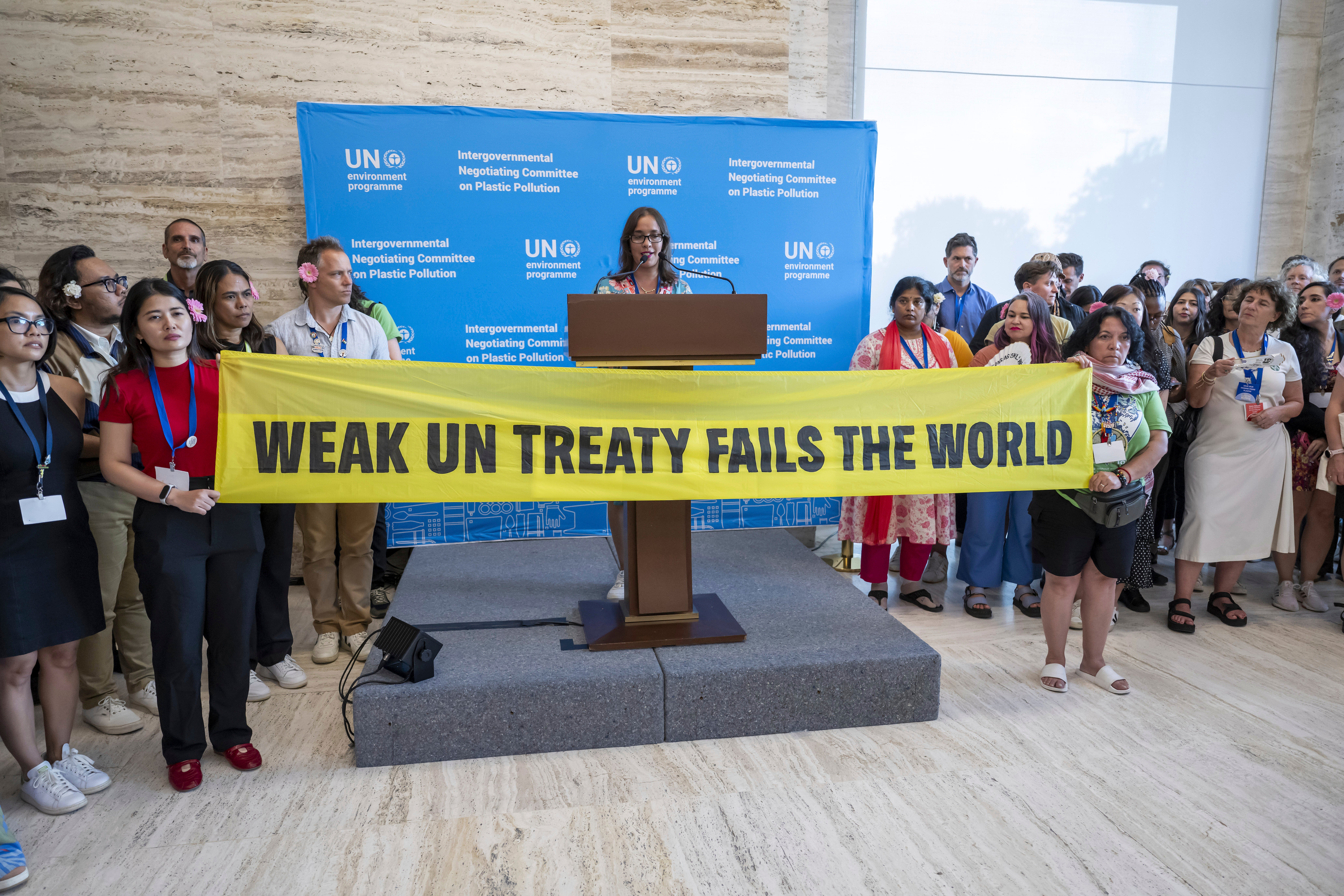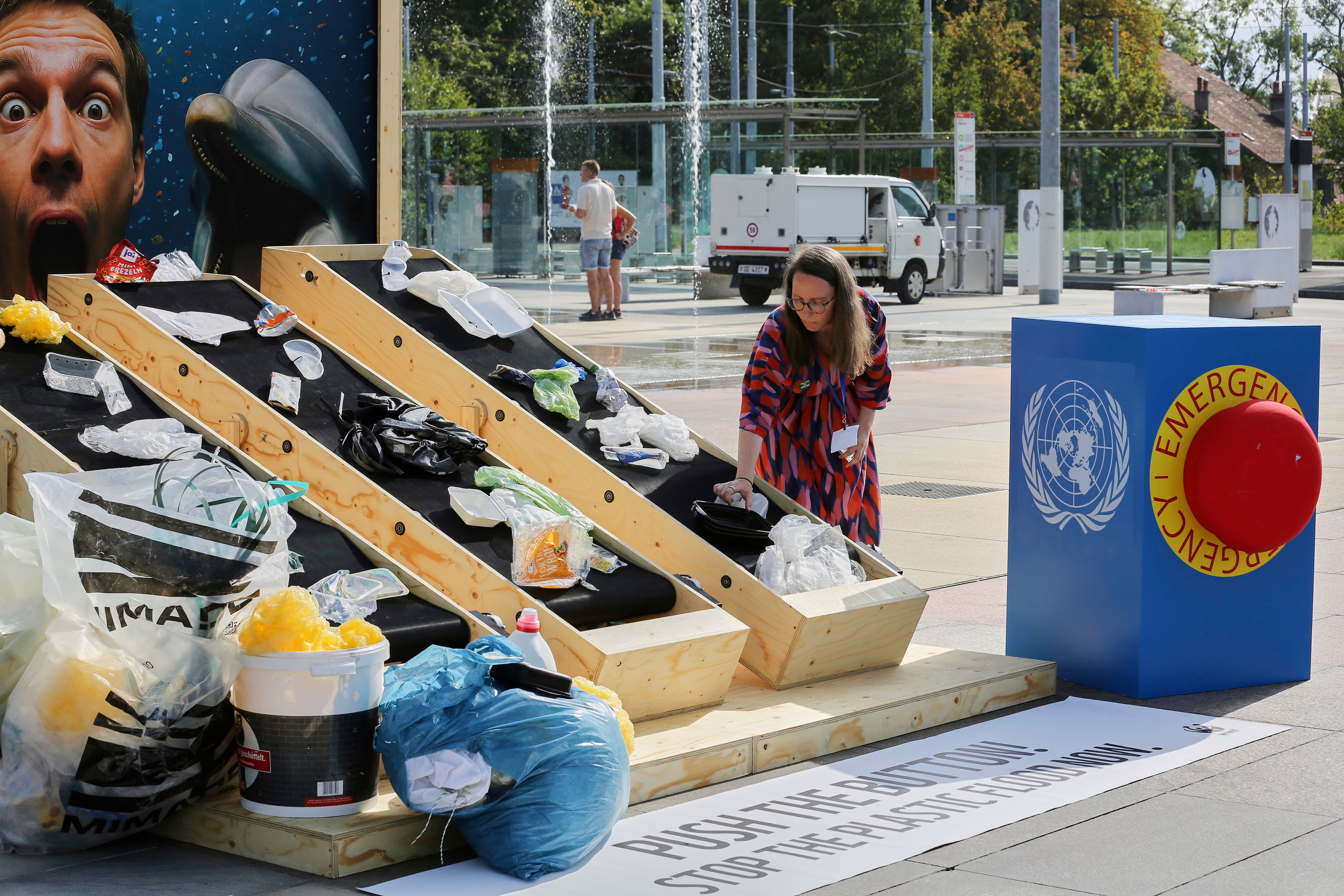Once again, global negotiations to secure a treaty to end plastic pollution have ended without agreement, after two weeks of talks in Geneva exposed irreconcilable divisions between petrochemical-producing nations and countries pushing for production caps.
Despite three years of negotiations and mounting evidence of the health and environmental toll of plastics, delegates failed to agree on whether it should stop the growth of plastic production and regulate harmful chemicals internationally.
The talks in Geneva were running overtime on Friday when countries rejected the proposal put forward by Luis Vayas Valdivieso, the chair of the negotiating committee, which many called weak and insufficient to deal with the scale of the problem.
This was the second time countries had gathered for the final negotiations for the treaty, after talks collapsed in Busan last year, where it was supposed to be finalised.
Campaigners called the summit ended as an “abject failure” and a missed opportunity of a generation.
“In the final days of the negotiations, we have clearly seen what many of us have known for some time – some countries did not come here to finalise a text, they came here to do the opposite: block any attempt at advancing a viable treaty,” David Azoulay, health programme director at Center for International Environmental Law Environmental (CIEL) said.
Greenpeace said the failure to reach a consensus on plastic pollution must be a wake-up call for the world.
“Ending plastic pollution means confronting fossil fuel interests head on,” said Graham Forbes, global plastics campaign lead for Greenpeace USA.
“The vast majority of governments want a strong agreement, yet a handful of bad actors were allowed to use process to drive such ambition into the ground. We cannot continue to do the same thing and expect a different result.”

However, Inger Andersen, executive director of the United Nations Environment Programme, said despite challenges, and despite the disappointment, “we have to accept that significant progress was made”.
This process won’t stop, she said, but it’s too soon to say how long it will take to get a treaty now.
The talks were billed as the most important environmental deal since the Paris climate accord, aiming to end plastic pollution across its entire lifecycle. That meant action not just on ocean litter, but also on extraction, product design, production, toxic chemicals, and disposal.
The negotiations were expected to end in Busan last year, but failure to find consensus among countries led to their collapse and negotiations were only resumed in Geneva last Tuesday.
However, the two weeks of talks couldn’t bridge the gap between countries suffering the most from plastic pollution and those benefiting from it.
In the final hours in Geneva, campaigners said many important clauses were either watered down or undecided, prompting many countries and campaigners to express frustrations.
Two drafts of treaty text, presented by Mr Vayas Valdivieso in the final days, in a bid to find common ground, were criticised by both oil-producing states and countries pushing for ambitious action.
That text omitted any limits on plastic production and sidestepped controls on the toxic chemicals used in plastics – two of the most contentious issues in over two years of negotiations.
Representatives of Norway, Australia, Tuvalu and other nations said they were deeply disappointed to be leaving Geneva without a treaty. Madagascar said the world is “expecting action, not reports from us”.
Around 100 countries pushed for mandatory production cuts, controls on hazardous plastic additives, and strong financing for implementation, particularly for the Global South. Oil-producing nations, led by Saudi Arabia, Russia and Iran, want the focus limited to managing waste, but campaigners warn that this will not solve the crisis.
Panama’s head delegate Juan Carlos Monterrey Gomez accused the chair of trampling over core demands in the last days as the draft text dropped, failing to include plastic production caps.
“Our red lines and red lines of the majority of countries represented in this room were not only stomped, they were spat on and they were burned,” he said.
“This is not about closing a treaty at any cost. It is about closing a wound that we’re leaving open in people’s lungs, in our rivers, in our oceans. But the text presented here makes that wound fatal … it is not ambition, it is surrender, and we will not sell out future generations for a text as weak as this.”
The UK warned it drove countries “towards the lowest common denominator”, and Bangladesh said it “fundamentally fails” to address the urgency of the crisis.
From the other side, Kuwait, speaking for the Like-Minded Group of oil producers, said the text had “gone beyond our red lines” and insisted “without consensus, there is no treaty worth signing”.
Saudi Arabia said “many red lines” had been crossed for the Arab Group, while Qatar argued that it was unclear what obligations countries would be entering into.

More than 400 million tonnes of plastic are produced globally each year, half of it for single-use items. Nearly half ends up in landfills, 17 per cent is incinerated, and around 22 per cent is mismanaged and leaks into the environment. Less than 10 per cent is recycled, a figure environmental scientists say makes it impossible to rely on recycling alone to solve the crisis.
Microplastics and plastic-related chemicals have also been found to be adversely impacting people’s health. Micro and nano plastic particles have been found in every human organ, even newborn babies, as well as food, water, soil and the highest peaks of mountains to the depths of the ocean.
Scientists say the only way to limit adverse health impacts from plastics is to curb their excessive production.
“Unless we curb hyper-production at the source, the situation will only get worse. Recycling alone will not solve this,” associate professor Melanie MacGregor, lead of the nano and microplastics research consortium at Flinders University, said.
The treaty, she said, was “a unique opportunity to ensure harmful additives are disclosed, new materials are proven safe before use, and upstream measures – like reducing production and simplifying plastic chemistry – are prioritised.”
Medical experts warn the consequences of inaction are severe. Dr Laura Downey of the George Institute for Global Health said: “Inaction on delivering this treaty is costing lives.”
She described plastic burning in Indonesia covering whole villages “in plastic particles”, causing both immediate breathing difficulties and long-term risks such as cancer and infertility.




